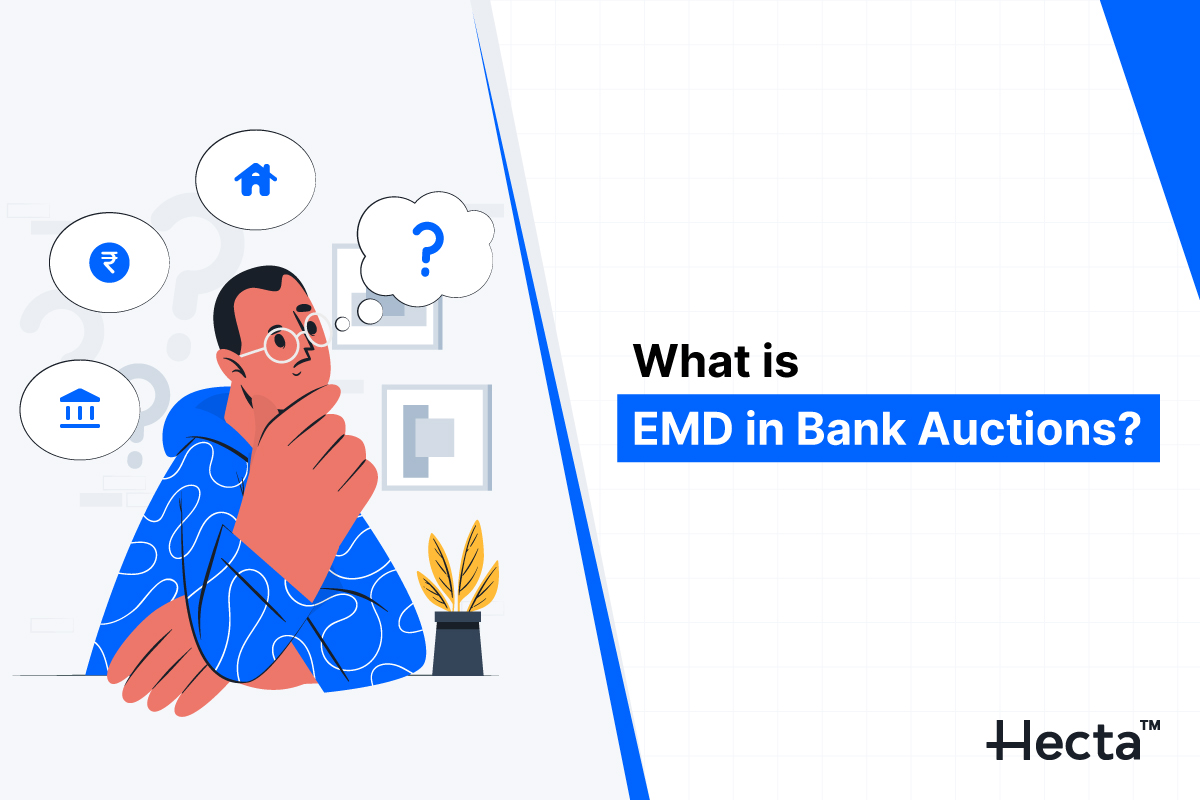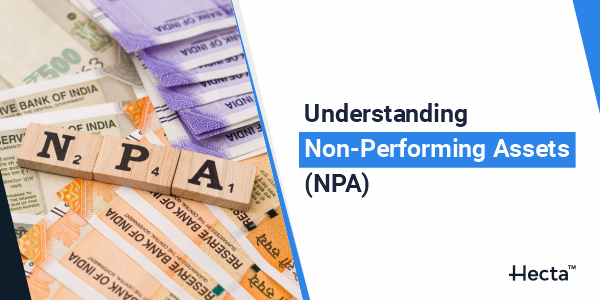
Discover the heart of Delhi with its diverse culture, iconic landmarks, vibrant markets, and dynamic real estate. Explore the essence of India’s capital.
Participating in bank auctions to buy properties can be an exciting opportunity, but it’s crucial to understand the concept of Earnest Money Deposit (EMD). In this blog, we will explore the meaning, process, and benefits of EMD in bank auctions to help you navigate the auction process with confidence and learn how Hecta can assist you in purchasing bank auction properties by guiding you through the auction process.
What is EMD (Earnest Money Deposit)?
EMD stands for Earnest Money Deposit. It is a refundable security deposit paid by bidders to the bank before participating in the auction. Think of it as a token of good faith, ensuring only genuine buyers engage in the bidding process. It is usually a percentage of the reserve price and helps to:
- Ensure only serious bidders enter the auction.
- Discourage non-genuine participants from disrupting the process.
By submitting EMD, bidders showcase their intent and ability to purchase the property, making it a critical component of online bank auctions.
Advantages of Participating in Bank Auctions with EMD
Both bidders and seller institutions benefit from the EMD system:
- Increased credibility for bidders: EMD is a way to ensure that bidders are serious about the auction.
- Encourages Competitive Bidding: With only serious participants, auctions tend to yield higher selling prices, benefiting the bank.
- Enhanced trust and transparency: EMD fosters a more trustworthy environment for both buyers and sellers.
How Does EMD Work in Bank Auctions?
Here’s a step-by-step breakdown of how EMD functions in bank auctions:
- Notification of Auction: The bank publishes an auction notice that includes key details such as the reserve price of the property, auction date, property schedule, and the EMD amount required to participate.
- Submission of EMD: Interested bidders are required to pay the specified EMD amount before the auction deadline. Payment methods such as NEFT, RTGS, Demand Draft, or Banker’s Cheque are typically accepted. Along with the payment, bidders must submit necessary documents, including proof of identity and the bid application form.
- Verification by Bank: Once the EMD payment is submitted, the bank verifies the details provided by the bidder.
- Auction Participation: Verified bidders gain access to the auction platform. During the auction, participants place bids, competing to secure the property.
- Refund to Unsuccessful Bidders: If the bidder loses the auction or backs out, the EMD is refunded. The refund process usually takes a few business days to reflect in the bidder’s account.
- Adjustment for Winning Bidder: For the winning bidder, the EMD amount is not refunded. Instead, it is adjusted against the final sale price of the property. The bidder is then required to pay the remaining balance within a stipulated timeframe as per the auction’s terms.
- Forfeiture of EMD: In cases where the winning bidder fails to complete the payment or withdraws after the auction, the EMD is forfeited by the bank.
This structured process ensures transparency, fairness, and security for all parties involved in the bank auction.
How to Pay EMD in Bank Auctions?
In India, bidders can pay the EMD using several methods:
- NEFT/RTGS Transfer: Direct electronic fund transfers to the bank.
- Demand Draft (DD): A pre-paid negotiable instrument issued by a bank.
- Banker’s Cheque: A cheque guaranteed by the issuing bank.
Documents Required for EMD Submission:
- Proof of identity (Aadhaar, PAN, etc.)
- A duly filled auction bid form (available at the bank branch or through Hecta’s assistance)
- Proof of EMD payment (bank receipt or transaction details)
EMD Amount: How is it Decided?
The EMD amount is usually a percentage of the reserve price, typically around 10%. Factors that influence the EMD amount include:
- Type of Property: The type of the property like residential, commercial, or industrial can impact the reserve price of the property and also the EMD in auction.
- Reserve Price: The lowest acceptable price specified by the seller for a property sold at auction. This excludes any and all dues against the property such as property tax, electricity, water, maintenance, industrial authority dues, etc.
- Auction Terms: Some auctions have flexible EMD requirements (regardless of the reserve price), while others strictly follow set percentages (usually 10% or the reserve price).
Rules and Refund Policy for EMD
Banks have clear rules for EMD refunds and forfeitures:
- Refund for Unsuccessful Bidders: EMD is returned to participants who do not win the auction.
- Forfeiture Conditions:
- Withdrawal of bid after winning the auction.
- Failure to pay the remaining balance within the stipulated timeframe.
Refund Timeline: Most banks process refunds within a few business days of the auction.
- RTGS/NEFT Transaction: For EMD paid via RTGS/NEFT transactions, refunds typically take 4-5 business days to reflect in the unsuccessful bidder’s account.
- Demand Draft (DD) Payments: For EMD paid via DD, refunds are processed faster, usually within 48 hours (excluding public holidays).
Bidders should keep a track of their refunds and contact the seller bank in case of any delays.
Tips for Participants Regarding EMD
To ensure a smooth experience in bank auctions, follow these tips:
- Review Terms and Conditions: Before submitting the EMD amount, carefully review all the auction rules to avoid unexpected issues.
- Keep Payment Proof: Maintain records of your EMD payment for future reference.
- Submit on Time: Late EMD submissions can lead to disqualification, so process payments well before the deadline.
- Seek Professional Advice: Consult financial and legal experts for guidance. Contact us to know more.
How Hecta Can Help You in the Bidding Process of Bank Auction Properties
Hecta simplifies the bank auction process with tools and expert guidance. Our platform provides:
- Choose a property: Explore our detailed auction listings and find a property that meets your requirements.
- EMD Payment and Application: Assistance with EMD payments and bid form application to prepare you for online auctions.
- Auction Guidance: Step by step guidance on how to take part in auctions and expert advice for a seamless bidding experience.
By choosing Hecta, you can confidently participate in bank auctions and secure your dream property.
FAQs
What Is EMD Bank Guarantee?
An EMD Bank Guarantee is a document issued by a bank assuring the auctioning authority that the bidder will comply with the auction requirements, ensuring payment of the EMD amount if needed.
What Is the Reserve Price?
The Reserve Price is the minimum price set by the seller bank for the auctioned property, below which bids are not accepted.
Is EMD Compulsory?
Yes, EMD is mandatory to participate in any bank auction.
What Happens If EMD Is Not Submitted?
Without EMD, you will not be eligible to bid or participate in the auction process.
Is EMD Refundable?
Yes, EMD is fully refundable to unsuccessful bidders after the auction concludes.
Can EMD Be Adjusted Against Other Purchases?
No, EMD is specifically tied to the property being auctioned and cannot be adjusted for other purchases.
Are There Any Tax Implications For EMD Payments?
Generally, there are no direct tax implications for EMD payments. However, you can consult with a tax advisor for specific scenarios.
How To Get EMD Exemption Certificate?
Certain entities, like government organizations or public sector undertakings, may qualify for EMD exemptions. Kindly check with the auctioning authority for eligibility and documentation requirements.
Where Can I Get A Bid Form?
Bid forms are typically available on the auctioning bank’s website or their designated branch offices.
Understanding Section 13(2) And 13(4)
These are legal provisions under the SARFAESI Act. Section 13(2) involves a demand notice to the borrower for loan repayment, while Section 13(4) allows the bank to take possession of the property if the borrower defaults.
What Is A Section 14 Order?
A Section 14 order is a legal directive enabling banks to take physical possession of a property through judicial intervention.
Who Pays The Dues On SARFAESI Properties?
Buyers are usually responsible for clearing any pending dues unless explicitly stated otherwise in the auction terms.
EMD Full Form in Banking
Earnest Money Deposit, a mandatory security deposit to participate in auctions.
Are you ready to participate in a bank auction? Explore our platform to find detailed listings and expert advice tailored to your needs. Start Now!
Disclaimer: This blog is for informational purposes only and should not be considered legal or financial advice.
Participating in bank auctions to buy properties can be an exciting opportunity, but it’s crucial to understand the concept of Earnest Money Deposit (EMD). In this blog, we will explore the meaning, process, and benefits of EMD in bank auctions to help you navigate the auction process with confidence and learn how Hecta can assist you in purchasing bank auction properties by guiding you through the auction process.
What is EMD (Earnest Money Deposit)?
EMD stands for Earnest Money Deposit. It is a refundable security deposit paid by bidders to the bank before participating in the auction. Think of it as a token of good faith, ensuring only genuine buyers engage in the bidding process. It is usually a percentage of the reserve price and helps to:
- Ensure only serious bidders enter the auction.
- Discourage non-genuine participants from disrupting the process.
By submitting EMD, bidders showcase their intent and ability to purchase the property, making it a critical component of online bank auctions.
Advantages of Participating in Bank Auctions with EMD
Both bidders and seller institutions benefit from the EMD system:
- Increased credibility for bidders: EMD is a way to ensure that bidders are serious about the auction.
- Encourages Competitive Bidding: With only serious participants, auctions tend to yield higher selling prices, benefiting the bank.
- Enhanced trust and transparency: EMD fosters a more trustworthy environment for both buyers and sellers.
How Does EMD Work in Bank Auctions?
Here’s a step-by-step breakdown of how EMD functions in bank auctions:
- Notification of Auction: The bank publishes an auction notice that includes key details such as the reserve price of the property, auction date, property schedule, and the EMD amount required to participate.
- Submission of EMD: Interested bidders are required to pay the specified EMD amount before the auction deadline. Payment methods such as NEFT, RTGS, Demand Draft, or Banker’s Cheque are typically accepted. Along with the payment, bidders must submit necessary documents, including proof of identity and the bid application form.
- Verification by Bank: Once the EMD payment is submitted, the bank verifies the details provided by the bidder.
- Auction Participation: Verified bidders gain access to the auction platform. During the auction, participants place bids, competing to secure the property.
- Refund to Unsuccessful Bidders: If the bidder loses the auction or backs out, the EMD is refunded. The refund process usually takes a few business days to reflect in the bidder’s account.
- Adjustment for Winning Bidder: For the winning bidder, the EMD amount is not refunded. Instead, it is adjusted against the final sale price of the property. The bidder is then required to pay the remaining balance within a stipulated timeframe as per the auction’s terms.
- Forfeiture of EMD: In cases where the winning bidder fails to complete the payment or withdraws after the auction, the EMD is forfeited by the bank.
This structured process ensures transparency, fairness, and security for all parties involved in the bank auction.
How to Pay EMD in Bank Auctions?
In India, bidders can pay the EMD using several methods:
- NEFT/RTGS Transfer: Direct electronic fund transfers to the bank.
- Demand Draft (DD): A pre-paid negotiable instrument issued by a bank.
- Banker’s Cheque: A cheque guaranteed by the issuing bank.
Documents Required for EMD Submission:
- Proof of identity (Aadhaar, PAN, etc.)
- A duly filled auction bid form (available at the bank branch or through Hecta’s assistance)
- Proof of EMD payment (bank receipt or transaction details)
EMD Amount: How is it Decided?
The EMD amount is usually a percentage of the reserve price, typically around 10%. Factors that influence the EMD amount include:
- Type of Property: The type of the property like residential, commercial, or industrial can impact the reserve price of the property and also the EMD in auction.
- Reserve Price: The lowest acceptable price specified by the seller for a property sold at auction. This excludes any and all dues against the property such as property tax, electricity, water, maintenance, industrial authority dues, etc.
- Auction Terms: Some auctions have flexible EMD requirements (regardless of the reserve price), while others strictly follow set percentages (usually 10% or the reserve price).
Rules and Refund Policy for EMD
Banks have clear rules for EMD refunds and forfeitures:
- Refund for Unsuccessful Bidders: EMD is returned to participants who do not win the auction.
- Forfeiture Conditions:
- Withdrawal of bid after winning the auction.
- Failure to pay the remaining balance within the stipulated timeframe.
Refund Timeline: Most banks process refunds within a few business days of the auction.
- RTGS/NEFT Transaction: For EMD paid via RTGS/NEFT transactions, refunds typically take 4-5 business days to reflect in the unsuccessful bidder’s account.
- Demand Draft (DD) Payments: For EMD paid via DD, refunds are processed faster, usually within 48 hours (excluding public holidays).
Bidders should keep a track of their refunds and contact the seller bank in case of any delays.
Tips for Participants Regarding EMD
To ensure a smooth experience in bank auctions, follow these tips:
- Review Terms and Conditions: Before submitting the EMD amount, carefully review all the auction rules to avoid unexpected issues.
- Keep Payment Proof: Maintain records of your EMD payment for future reference.
- Submit on Time: Late EMD submissions can lead to disqualification, so process payments well before the deadline.
- Seek Professional Advice: Consult financial and legal experts for guidance. Contact us to know more.
How Hecta Can Help You in the Bidding Process of Bank Auction Properties
Hecta simplifies the bank auction process with tools and expert guidance. Our platform provides:
- Choose a property: Explore our detailed auction listings and find a property that meets your requirements.
- EMD Payment and Application: Assistance with EMD payments and bid form application to prepare you for online auctions.
- Auction Guidance: Step by step guidance on how to take part in auctions and expert advice for a seamless bidding experience.
By choosing Hecta, you can confidently participate in bank auctions and secure your dream property.
FAQs
What Is EMD Bank Guarantee?
An EMD Bank Guarantee is a document issued by a bank assuring the auctioning authority that the bidder will comply with the auction requirements, ensuring payment of the EMD amount if needed.
What Is the Reserve Price?
The Reserve Price is the minimum price set by the seller bank for the auctioned property, below which bids are not accepted.
Is EMD Compulsory?
Yes, EMD is mandatory to participate in any bank auction.
What Happens If EMD Is Not Submitted?
Without EMD, you will not be eligible to bid or participate in the auction process.
Is EMD Refundable?
Yes, EMD is fully refundable to unsuccessful bidders after the auction concludes.
Can EMD Be Adjusted Against Other Purchases?
No, EMD is specifically tied to the property being auctioned and cannot be adjusted for other purchases.
Are There Any Tax Implications For EMD Payments?
Generally, there are no direct tax implications for EMD payments. However, you can consult with a tax advisor for specific scenarios.
How To Get EMD Exemption Certificate?
Certain entities, like government organizations or public sector undertakings, may qualify for EMD exemptions. Kindly check with the auctioning authority for eligibility and documentation requirements.
Where Can I Get A Bid Form?
Bid forms are typically available on the auctioning bank’s website or their designated branch offices.
Understanding Section 13(2) And 13(4)
These are legal provisions under the SARFAESI Act. Section 13(2) involves a demand notice to the borrower for loan repayment, while Section 13(4) allows the bank to take possession of the property if the borrower defaults.
What Is A Section 14 Order?
A Section 14 order is a legal directive enabling banks to take physical possession of a property through judicial intervention.
Who Pays The Dues On SARFAESI Properties?
Buyers are usually responsible for clearing any pending dues unless explicitly stated otherwise in the auction terms.
EMD Full Form in Banking
Earnest Money Deposit, a mandatory security deposit to participate in auctions.
Are you ready to participate in a bank auction? Explore our platform to find detailed listings and expert advice tailored to your needs. Start Now!
Disclaimer: This blog is for informational purposes only and should not be considered legal or financial advice.

